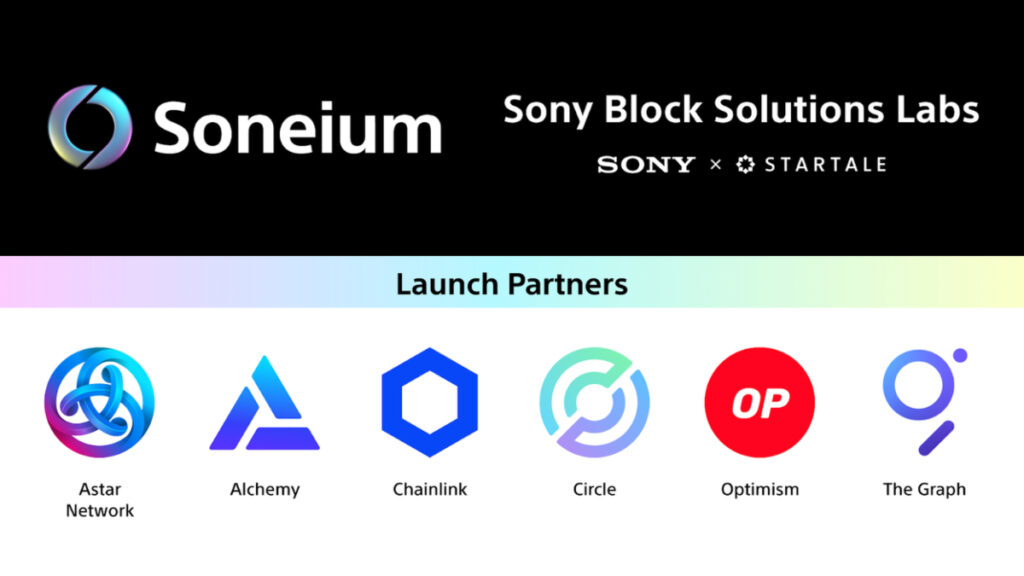
Sony Block Solutions Labs (Sony SBL) revealed Soneium, an Ethereum layer-2 blockchain that features improved security and user-friendliness for more accessibility.
An Ethereum layer-2 is a secondary blockchain built on top of an Ethereum layer-1 blockchain to increase the scalability of the primary network. The secondary layers allow for faster and cheaper transaction fees for executing Ethereum transactions.
Soneium aims to deliver innovative apps spanning entertainment, gaming, finance, and numerous other possibilities.
SBL chairman Jun Watanabe shared, “We think the development of a comprehensive Web3 solution based on blockchain is very significant to the Sony Group, which has developed a wide variety of businesses under its purpose of “Fill the world with emotion, through the power of creativity and technology”. We will work to create diverse businesses and new use cases with the aim of delivering customer value that can only be enjoyed through Web3 technology to as many users as possible and making people’s lives richer and more colourful.”
SBL director Sota Watanabe stated, “We believe that Sony Group’s launch of an Ethereum Layer 2 in collaboration with Startale is a pivotal moment for the entire industry. The industry has been making something web3 people want because of the lack of general user touchpoints and their feedback. Sony Group has strong distribution channels in multiple industries and existing users in our daily lives. Through Soneium, we will make something people want and go mainstream beyond web3.”
By planning to leverage Sony Group’s vast experience, they aim to bridge the gap between decentralised innovation and everyday consumer applications and truly bring Web3 into the mainstream. Beyond integrating existing Web3 services, Sonieum will explore new services linked to businesses within the Sony Group.
Web3 is said to be the third generation of the internet and is based on decentralisation. Web3 applications combine digital ownership and give users more authority over their data and online activities. Some examples of Web3 applications include cryptocurrencies like Bitcoin, social networks like Diaspora and blogging platform Steemit.
This approach is designed to create compelling use cases that can stimulate interest among people who have never used Web3 services before. Key areas of exploration include the protection of rights for creator-generated content, new mechanisms for equitable profit-sharing to support both creators and fans and opportunities for creators to seamlessly operate across digital and real-world environments.
Soneium leverages the Op Stack developed by the Optimism Foundation to create a scalable, EVM-compatible, developer-friendly blockchain. The Op Stack is used to make blockchain layers more reliable and is a shared open-source system.
To further support Soneium’s upcoming testnet launch, several established Web3 companies, including Optimism, Circle, Alchemy, The Graph, and Chainlink, have joined as technology launch partners.
To fully meet the needs of modern blockchain builders, Soneium testnet will offer a robust and comprehensive development environment and ecosystem, including a fully-featured testnet framework that closely mirrors the conditions of the upcoming mainnet. The blockchain’s advanced smart contract capabilities and scalable infrastructure will enable developers to design high-volume applications and grow their projects without any constraints.
Soneium testnet will offer built-in tools to help developers navigate the complex landscape of global regulations, making it easier to create compliant applications that can reach a worldwide audience.
Sony SBL is gearing up for Soneium’s testnet launch, providing developers with their first hands-on experience with the blockchain. In the coming weeks, Soneium will release technical documentation detailing the platform’s intricacies and all the required tools and SDKs (Software Development Kits), allowing developers to start building on Soneium right away.
